04
Aug 2022A Repurposed Chinese Character in Sanya
Last week I made my very first (and very overdue) trip to Sanya (三亚). Sanya is a city on the south side of the southernmost island off of mainland China. It’s basically the farthest south you can go on land in China. As such, it’s got a nice tropical climate and a bit of a beach party vibe (at least at the touristy places where most of us visitors from Shanghai end up).
The place we went is called 后海村 (Hòuhǎi Cūn), and it’s a smaller, relatively less developed part of the island focused on surfing. Yes, surfing… surfing tiny, tiny waves. I didn’t realize how small waves could be and still allow for “surfing” (of sorts) until this trip. Perfect for kids.
Anyway, there are lots of surf shops around the island, and I ran into this name on one:
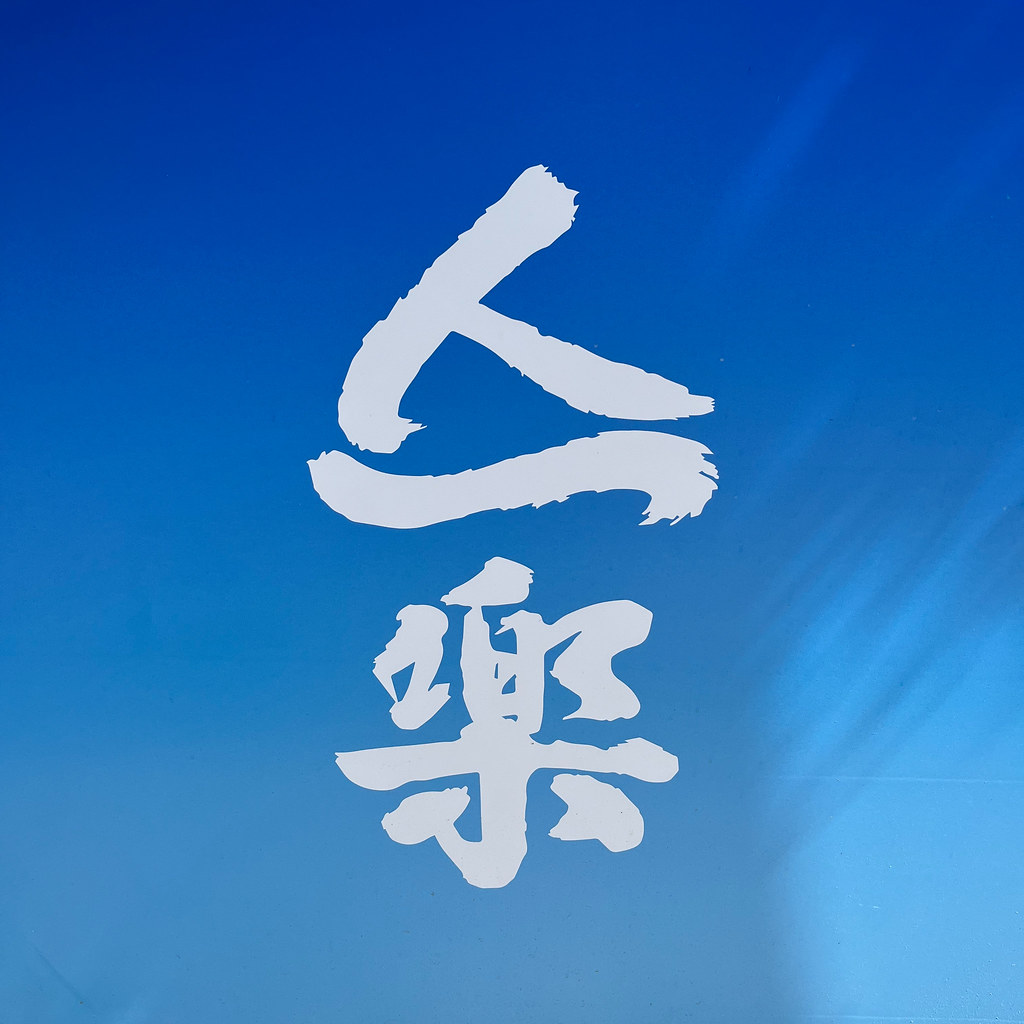
The name of the shop was “Jile,” and the bottom character is clearly the traditional character 樂 (lè), which is 乐 (lè) in simplified. But what’s up with that top character? Is it even Chinese? Some of my Chinese friends with me weren’t even sure. So naturally I asked the staff in the shop about the character.
They explained that 亼 (jí) is a real Chinese character, but it was chosen for its visual appeal: it totally looks like a person (人) on a surfboard (一)! I thought that was really cool.
I later looked up the character 亼 in Pleco and found that it is a variant of 集 (jí). So literally, 亼樂 (Jílè) means something like “gather bliss.” It also has all kinds of other positive homophonic associations. Altogether a pretty cool name.
Then, checking the Outlier Character Dictionary within Pleco, I discovered that the ancient form of the character 亼 looks like this:

Sure, it looks like a letter “A,” but to extend Jile’s pictograph, it also looks like a person carrying the surfboard. It probably took that poor 人 a really long time to be able to put down that board and start surfing… Glad he made it in the end.
21
Jul 2022Does This Font Make the Character Unreadable?
I’ve been seeing this app icon in ads around Shanghai recently:

Can you read it? Specifically, I want to focus on the character on the left.
Whether you can read it is all about how you parse the different parts of the character. Clearly this structure is of the overall form ⿰, with the right half further breaking down into ⿱. Pretty standard.
Top right looks like 日, so that seems fine. But what about the left side and bottom right?
Left side looks most like 讠 (言字旁) to me. Maybe 氵 (三点水), since those bottom two strokes are sometimes run together. What it does not look like to me is 彳 (双人旁). But that’s what it is.
Bottom right looks like a deformed 于, and even reminds me of 毛 (but it’s clearly not that). However, it’s actually 寸 (with a stroke above it), and the 日 above is actually part of 旦. That’s quite a bit of stylization.
So the character on the left is 得 (dé). The app name is 得物 (Déwù).
I asked some native speakers what they thought about it, and their reactions ranged from “it is hard to read” to “it’s just a little artsy.”
This is the most egregious of “stylization making a character hard to read” that I’ve run into in a while. For me it was difficult to read, but guessable. But evidently non-native speakers are cool with it.
13
Jul 2022Eason and Lason
Two little personal stories about creativity, adaptation, and prejudice.
Eason
When I first heard this English name I didn’t like it much, and just chalked it up to “Chinese creativity” with English. Later I realize that “Eason” was actually the transcription (back to English) of the Chinese mispronunciation of “Ethan.” The spelling is a reasonable mix of the word “easy” and the name “Jason.” This made me like it less.
But then, after more observation and reflection, I realized that “Eason” is actually in some ways better than “Ethan” within a Chinese context, because older Chinese people here without any English skills can actually say “Eason,” whereas they have little hope of ever pronouncing the [θ] sound in “Ethan.”
So while I can’t say I like this name (the Name Nazi in me still insists that it’s not a real name), I get it now, and I have a newfound appreciation for it.
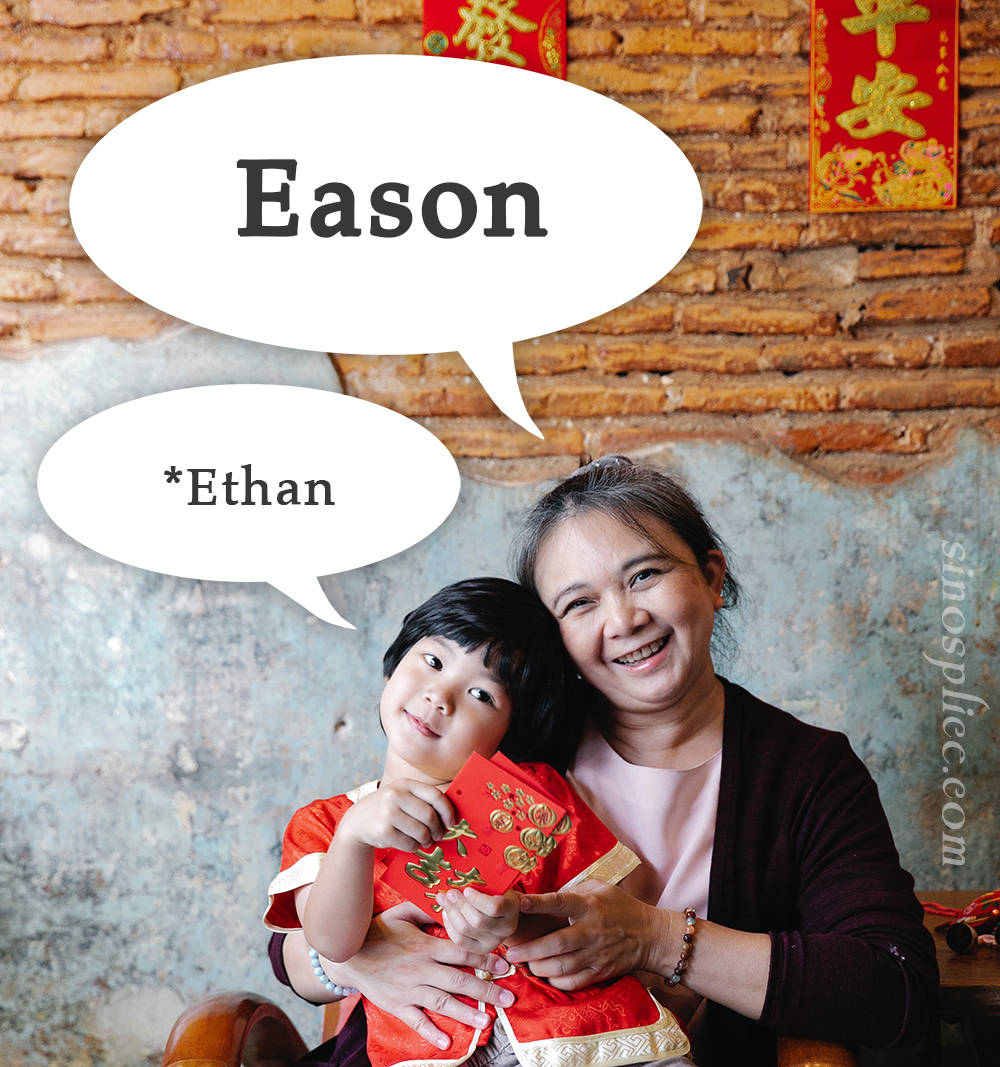
Lason
This is a name that always struck me as quite unusual. I assumed it was just a creative alternation of the name “Jason.” (Or maybe a kid wrote a backwards J that looked like an L, and thus “Lason” was born?)
After my realization about Eason, though, I suspect that this one is a double-whammy of mispronunciations converted back into English. This could be your standard “s” for “th” pronunciation substitution, combined with a (less intuitive) “L” for “N” substitution that you get in some Chinese regional accents. Hence, “Lason” from “Nathan.”
This English name has the additional amusing feature of sounding (to the Chinese) like the Chinese title for Thor, God of Thunder: 雷神 (Léi Shén).
I must admit, I struggle a bit more to accept this one. Not sure if it’s the perceived “double whammy of English mispronunciations” that does it, or if it’s the old Name Nazi prejudices, or if it’s just something aesthetic about it.
Conclusion
But anyway, Lason is gonna be Lason. My opinion doesn’t matter a whole lot in the grand scheme of things. An educator has influence, sure, but if Chinese society raises a whole generation of Lasons, they can change the landscape of English names globally. That’s kind of cool.
07
Jul 2022The Press: a nice Cafe/Restaurant in Shanghai
I don’t often write about food or restaurants here. Maybe it’s finally being able to actually eat in a restaurant that’s got me excited about it; I don’t know. But I really liked this restaurant near the Bund called The Press (申报饭店). It’s got cool old Shanghai Western-style architecture, plenty of Shanghai culture, Italian food on the menu (my kids loved it!), and great espresso-based coffee. We hung out here all afternoon on a weekend.

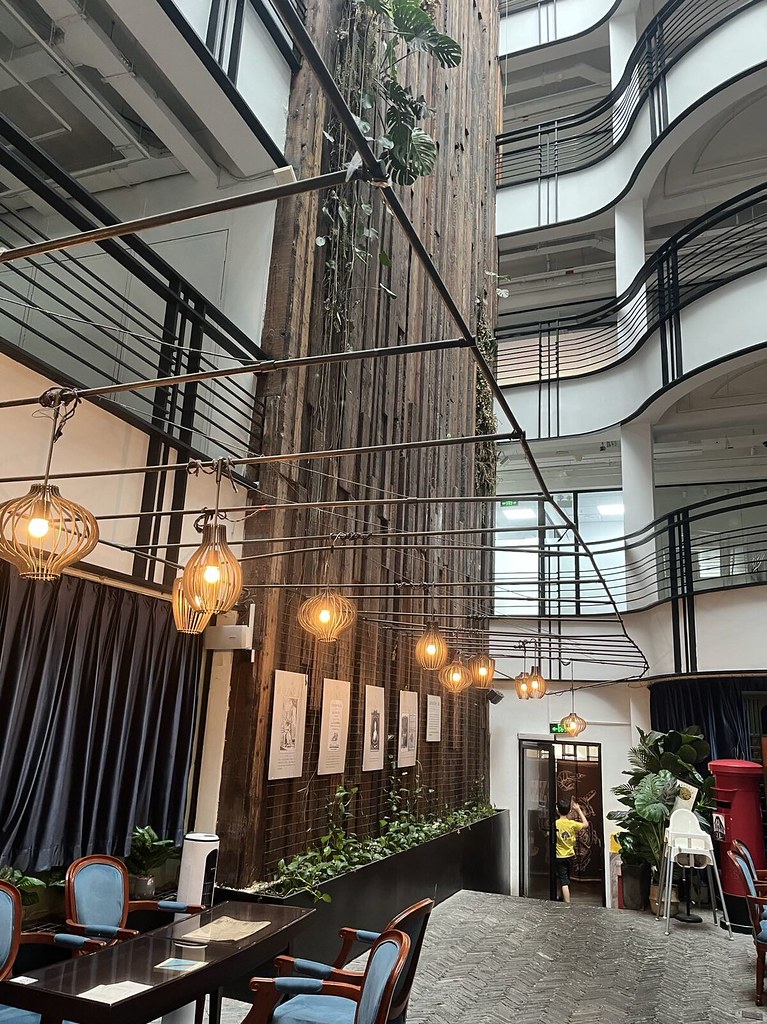

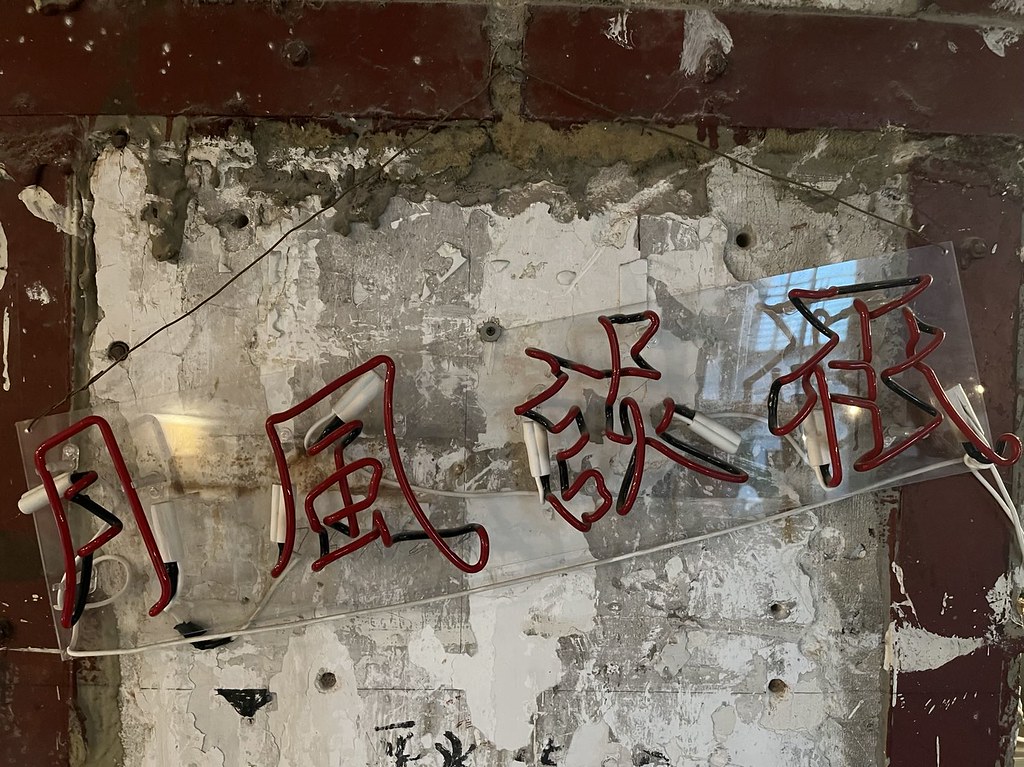
There’s something captivating about neon signs written in Chinese characters. Same principles as any neon sign, but it seems waaayyy more complicated to do Chinese characters.
This actually one reads right to left, but represented left to right it would be: 祗談風月 (in simplified: 只谈风月). Something like “just talk of beautiful scenery.”
Anyway, worth a visit: The Press (申报饭店).
29
Jun 2022Bianging around with Biang
After writing that blog post about the crazy Chinese character “biang“ a while back, I had to share this tweet by Alexander Zapryagaev @JPRidgeway about biang:
You think you saw biang? Get ready for:
- to make a biang sound
- to biang something
- wild biang in the forest
- chemical element biangium
- to catch a biang in the river
- River Biang
- to eat biang
- it’s raining biang
- World Capital of Biang
- the demon of Biang

This is a great illustration of how character components can impart meaning by combining with another character. If you’re a beginner to Chinese characters, you probably still recognize a few of these components. (Feel free to ignore the craziness that is biang!)
Learners: why not try the same exercise with a character that is not biang? You might accidentally “create” a character that already exists, but this is pretty cool in itself, because you can compare your own meaning with the actual meaning and learn something in the process!
24
Jun 2022Bad Translation Puzzle: “Divided”
I was at Shanghai’s Global Harbor mall the other day (it’s open, but there’s hardly any business, and eat-in dining is still prohibited at restaurants), and I saw this text on the window:

A zoomed in version of the key part:
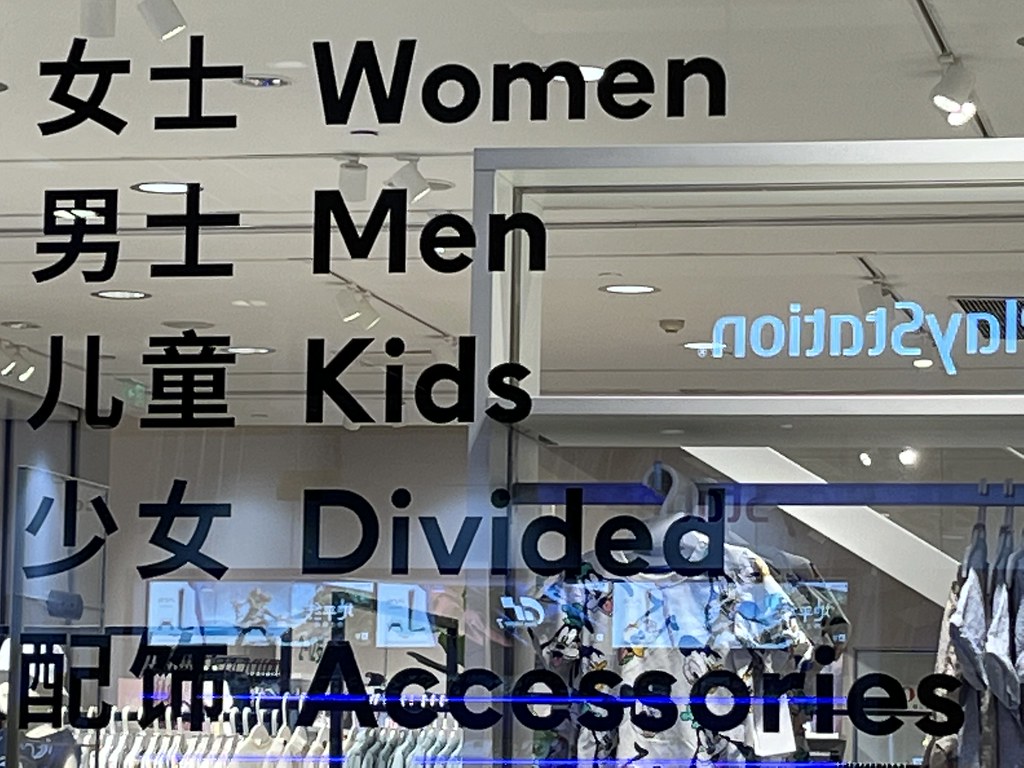
My 10yo daughter spotted it and was rightly confused by it. 少女 (shàonǚ) means “young woman” (girl in her early teens), and I suppose in a clothing story that would be “juniors” or something similar. Anyway, I can’t figure out how anyone could possibly get the translation “divided” out of 少女. Often errors like this are a result of over-reliance on machine translation, and usually it’s not too hard to figure out how the bad translation happened. Not so easy in this case!
The only thing I can think of is the word 少于 (shǎoyú), which means “less than.” It’s at least math, but still not an explanation. Otherwise, something like 分类 (fēnlèi), meaning “categories” (of clothing) could be a source, I suppose. “Categories” are sometimes referred to as “divisions.”
UPDATE: OK, I utterly failed this “translation puzzle.” Apparently H&M simply calls their “juniors” department “Divided.” Considering that the other departments are just direct translations, this possibility didn’t even occur to me. Thank you, commenters!
15
Jun 2022Lobby, I think
I love this image:

I love it because it’s so simple, and yet to appreciate it you need an understanding of Chinese vocabulary which goes beyond simple memorization (you need to understand a bit about the morpheme 吧), and you also need to be familiar with multiple translation possibilities of the particle 吧. So all kinds of translations for 吧 like “let’s” or “right?” or “I guess” or even “I think” really do make sense.
And now the breakdown just in case this one is still a bit beyond your level:
- 大堂 (dàtáng) lobby (of a hotel)
- 吧 (bā) is sometimes an abbreviation of 酒吧 (jiǔbā), meaning “bar”
- 吧 (ba) is also a grammatical particle
So 大堂吧 (dàtáng bā) refers to a Lobby Bar/Lounge, in no uncertain way.
This image will also be in an upcoming issue of the free ARC (Advanced Readings in Chinese) Newsletter, and we’re starting to do more with jokes and memes these days, so please sign up if you like this kind of thing.
06
Jun 2022Shanghai Lockdown Aftermath
So as of June 1st, 2022, Shanghai has ended the city-wide lockdown, and we are once again “free.” With some qualification, of course. Free to go outside, wearing a mask, but not free to enter any public building or use public transportation unless you have NAT (nucleic acid test) results from the past 72 hours. And since it typically takes close to 24 hours to get the results, yeah… we’ve gotta do a lot of testing. For the entire month of June, I’m hearing. Fortunately the swabbing is universally fairly gentle now, in the back of the throat rather than way up in your nasal cavity.
June 1st, the first day out, was pretty ridiculous in that almost no stores were open, and everyone seemed to have gone out just to find a public testing spot and then line up for hours to get a test done. Those free public tests were only available for limited hours (1:30 to 4pm was the afternoon slot), and the lines were worse than Disney World.
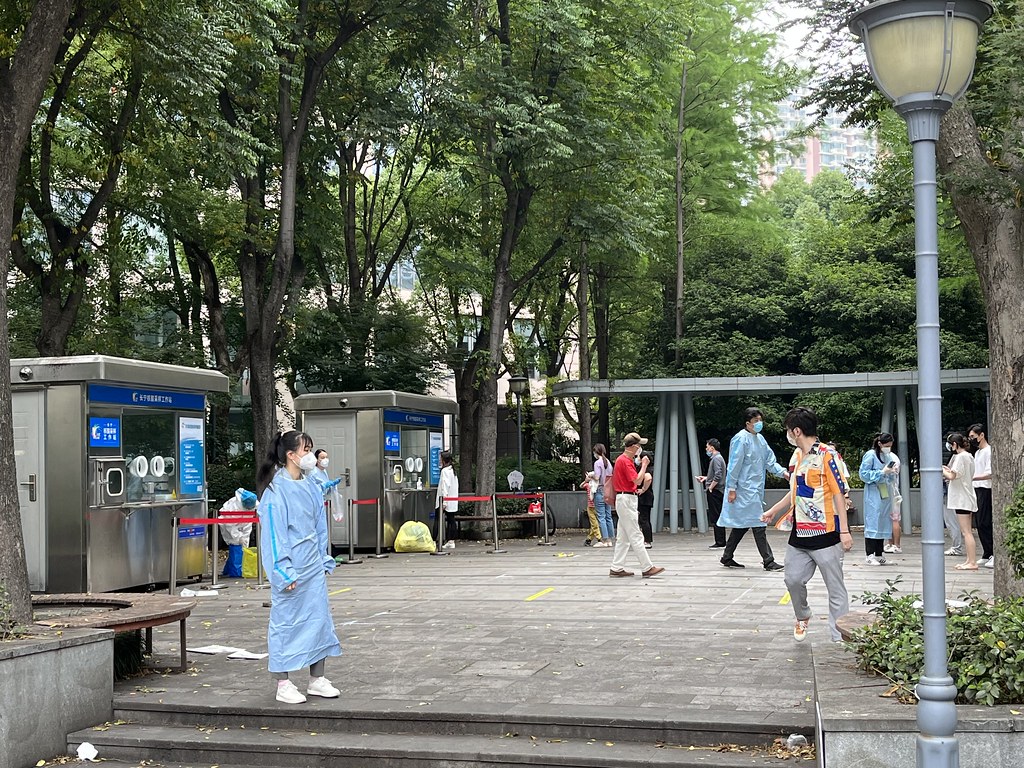
I waited until almost 3:45pm on Wednesday, June 1st to get mine done in a public testing center near my home, trusting that the results would be speedy. The results were not speedy. In fact, they never came out at all! I almost wasn’t allowed back into my own office building after lunch on that Thursday because I no longer had a valid “negative” result within that 72-hour window. Apparently this kind of thing is fairly common. My co-worker almost wasn’t able to take the subway to get home from work. His results came out just in time for him to go home an hour later.
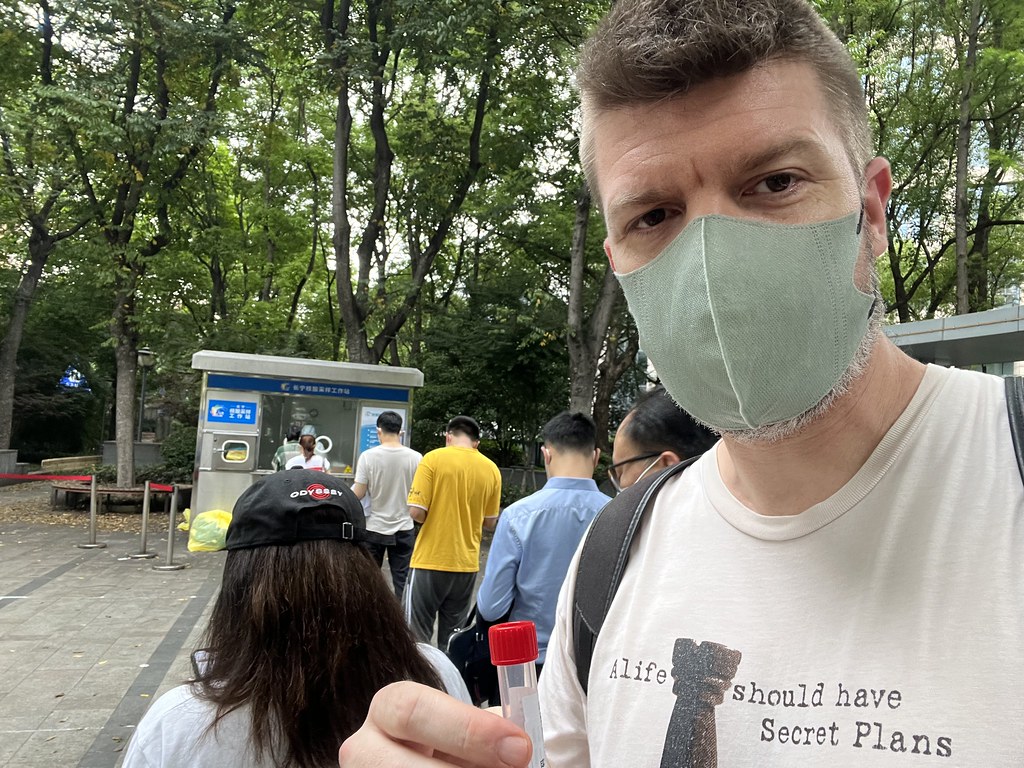
Most Shanghai residents I talk to are resigned to just getting a test every day wherever is convenient. Some apartment complexes still have free tests for residents. After those first few days, waits in public testing spots are typically quite short already (under 5 minutes), and there really are free testing booths everywhere now. They’re clearly designed to be temporary.
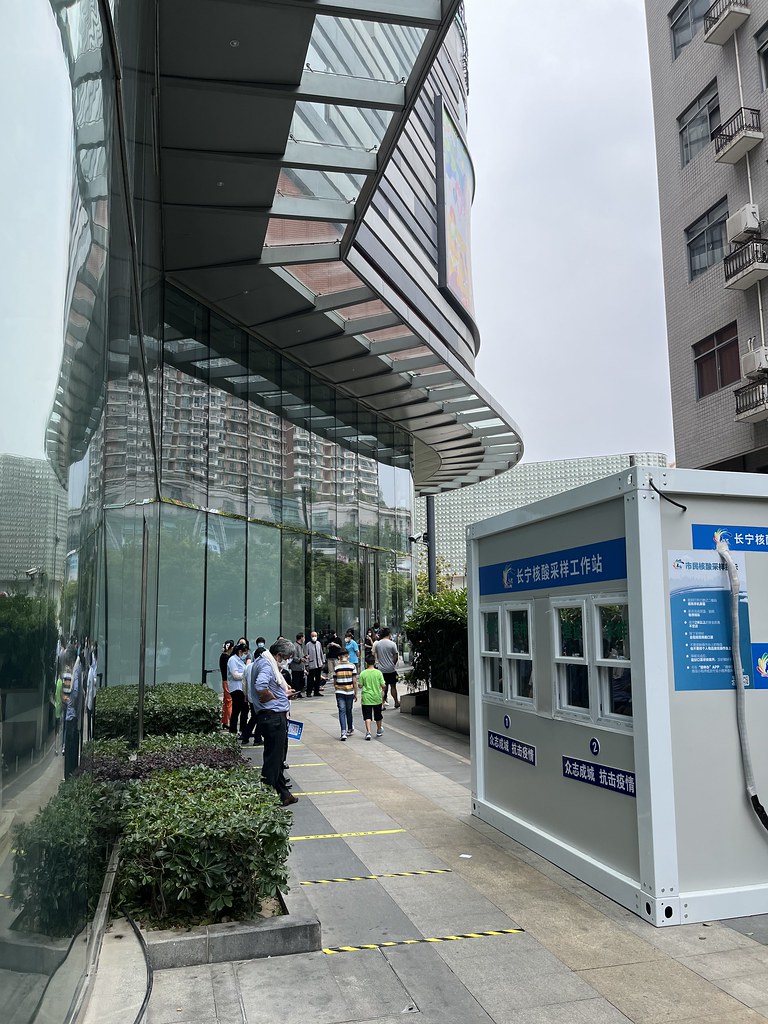
Let’s hope they’re temporary!
24
May 2022The Chinese Nickname for “Love, Death & Robots”
So you know the Netflix sci-fi anthology show Love, Death + Robots, right? Season 3 just dropped, and it’s being hailed as a return to form, almost as good as season 1, whereas season 2 was a bit of a disappointment. What you may not know is that the show is quite popular in China (or in Shanghai, at least). Due to its adult nature (violence, gore, nudity, sexual content), Love, Death & Robots was always going to have a hard time finding a prominent slot on any government-approved video streaming platform. But the show is super interesting in the ideas that it presents, and it does so in style, so Chinese sci-fi fans have been eating it up ever since season 1 come out.
Although each episode has a name, Love, Death & Robots also likes to use icons for each episode title. In fact, the name “Love, Death & Robots” itself is sometimes written in emoji as “❤️❌🤖.” So it’s not surprising that Chinese viewers have slapped a more interesting moniker on this show. While the official Chinese translation of Love, Death & Robots may be the expected 爱,死亡和机器人 (Ài, Sǐwáng hé Jīqìrén), the commonly used nickname in Chinese is the much shorter 爱死机 (Ài Sǐ Jī). Instead of an emoji per word, it’s a Chinese character per word. It gets the point across.
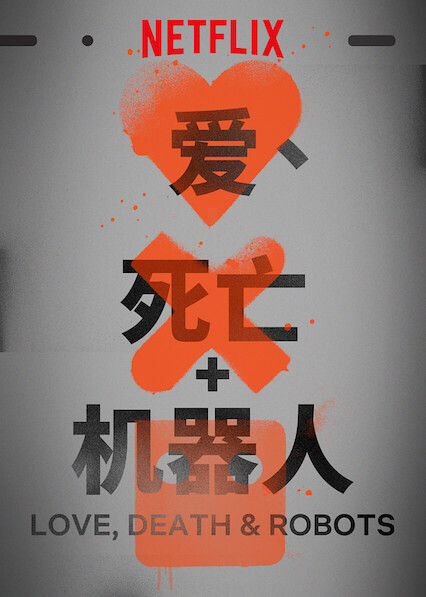
But what’s interesting about this nickname? Well, it’s not only used in writing; it’s also used in spoken Chinese. And when you hear 爱死机 (Ài Sǐ Jī) for the first time, whether you’re a native speaker or a learner, you have no idea what you’re hearing. It’s hard to make sense of. If you see the characters but are unaware that it’s the name of a sci-fi anthology series, there are still multiple possible interpretations:
- 爱死机 (ài-sǐ jī) to love to death a machine
- 爱死机 (àisǐ-jī) a machine that loves to death
- 爱死机 (ài sǐjī) loves to crash (the word 死机 is a common term for when a computer freezes up and needs a reboot)
- 爱死机 (Ài Sǐ Jī) ❤️❌🤖 (no one guesses this one)
So it’s kind of fun.
19
May 2022Chinese Capri-Sun is Down with Chinese Slang
I was surprised to see this on the Capri-Sun I ordered for my kids:
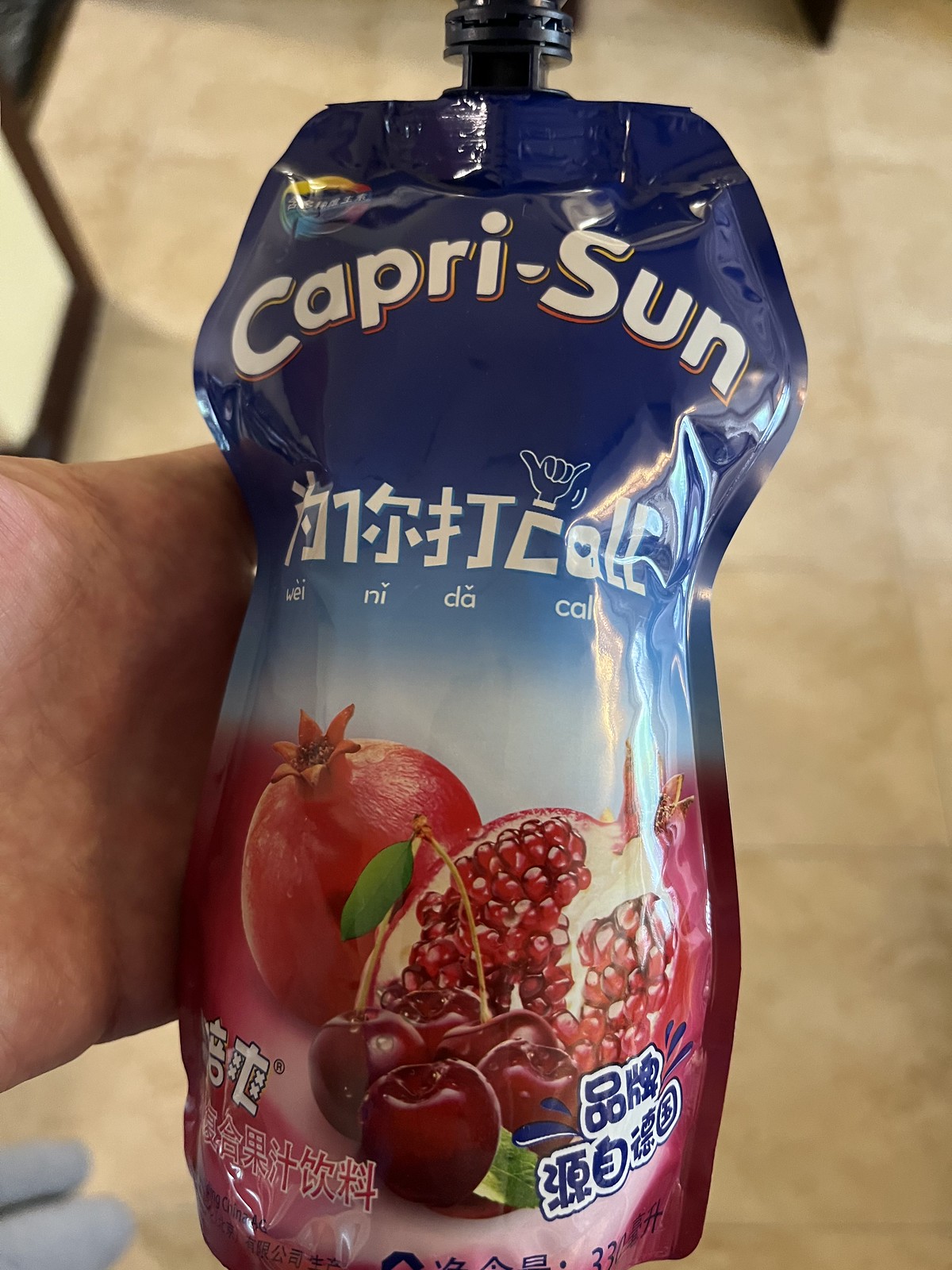
No Chinese for the name “Capri-Sun,” but the Chinese reads:
为 你 打 call
wèi nǐ dǎ call
I’m always wary of investing too much time into new Chinese slang, because a lot of it falls out of usage very quickly. 打call, however, seems to be withstanding the test of time.
Just for fun I asked my 10-year-old daughter (who attends an all-Chinese school) if she knows what “打call” means. She didn’t. She guessed it meant “to make a phone call.” This is a common guess among Chinese people that don’t know the term, so don’t feel bad if that’s what you thought too. Plus there’s that “hang loose” hand symbol which seems to reinforce the incorrect “make a phone call” interpretation.
“为你打call” simply means “to support you,” or “supporting you” might sound better in this context. Even though some Chinese people don’t even know it (mostly kids and old people; my wife knew it) It’s a slang term I feel is worth knowing, since it’s been around over 5 years already and has not disappeared yet. Plus, as you can see, it’s still appearing in companies’ marketing efforts.
Oh, and for more info on this use of 为, as always, check the Chinese Grammar Wiki.
11
May 2022Year 2-0-e-e
Here’s another pun for ya, in the context of the Shanghai 2022 Lockdown:
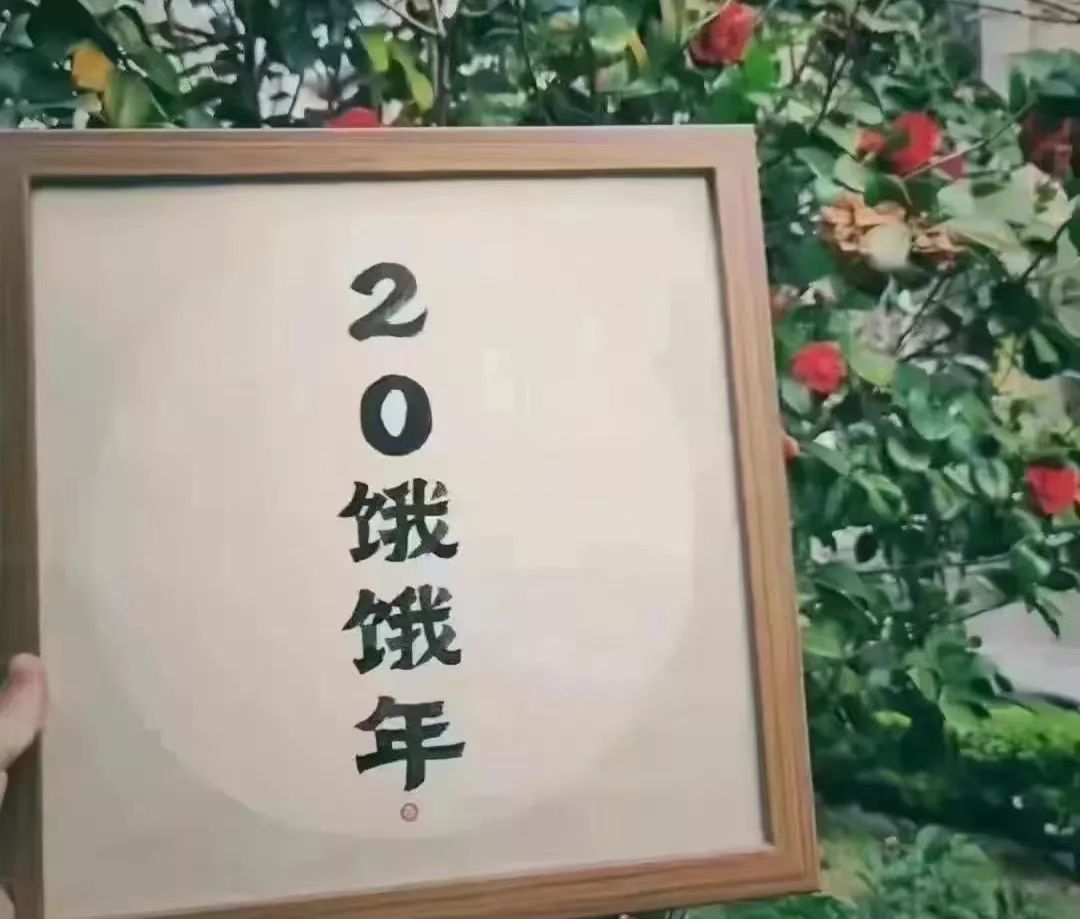
This one is pretty beginner-friendly!
20饿饿年 (èr-líng-è-è nián)
Key to this pun is that pinyin “e” sounds very much like pinyin “er” in many dialects of Mandarin, especially Taiwanese Mandarin. It doesn’t sound as similar in Beijing Mandarin, but the pun still works.
Fortunately, most of us are not actually starving during the Shanghai Lockdown, although some residents are certainly having a harder time than others. Although I’m currently on Lockdown Day 41 at home and can move freely around within my compound, many others in Shanghai are well past Day 50 and are totally stuck indoors, plus have to do daily testing (which I no longer have to do).
P.S. More advanced learners should be sure to check out the Advanced Readings in Chinese (ARC) special Shanghai Lockdown meme edition #1 and special Shanghai Lockdown meme edition #2. (If anyone wants a more thorough analysis of any of those memes here, let me know.)
03
May 2022Chinese Distorted: a Reading Challenge
This was floating around Chinese social media recently. If you’re at least intermediate level, take a look. It might take some time, but you should be able to slowly start making sense of these “characters”:

My first reaction was “what the–?? I can’t read this.” But within 10 seconds I was deciphering certain characters, and pretty soon I had read the entire thing.
I won’t post the electronic answer here, but if anyone wants it, I can leave it in the comments.
26
Apr 2022The Shanghai Lockdown, in Steps
Looking at the steps I’ve taken over the past month, it’s pretty easy to see three phases:
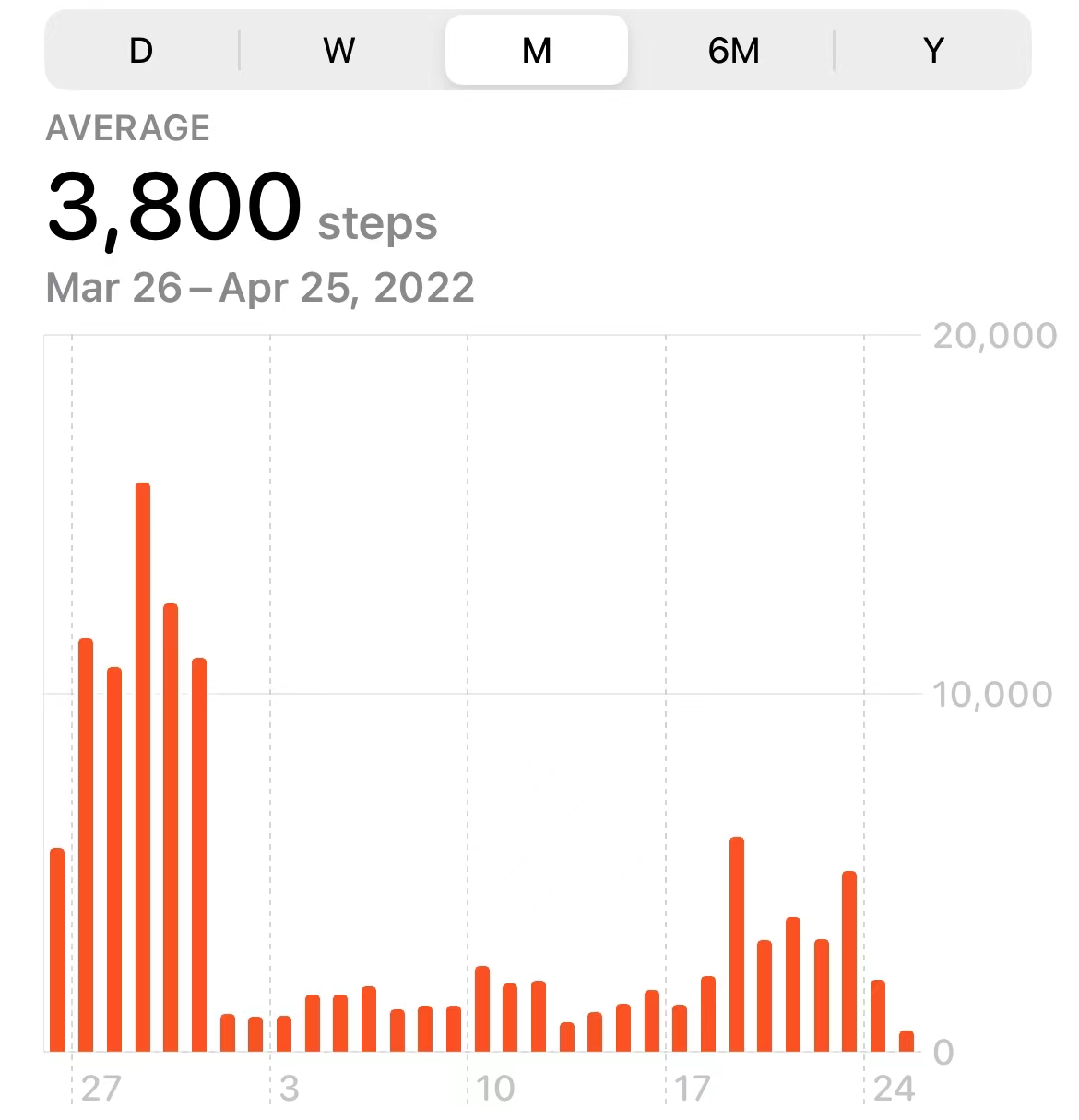
- Before the lockdown: I was getting good at averaging at least 10,000 steps per day.
- April 1st: the lockdown begins.
- April 19th: the strict lockdown (as a result of a positive case in my building) is lifted, and we’re allowed to go outside within our compound again.
We’re not sure when we’ll be able to leave our compound again (or when any shops will be open again), or when regular personal deliveries (non-group buys) will resume.
Meanwhile, there’s talk of a lockdown coming to Beijing…
20
Apr 2022Shanghai Lockdown 2022: the Neighbors
The last time I wrote about the April 2022 Shanghai Lockdown was April 7th, one week in (for me). It’s now April 20th and the lockdown continues, so it’s time for an update.
It’s not the Cultural Revolution all over again
First of all, I’d like to address some of the negative press the lockdown has received. I’m not enjoying this lockdown and I don’t think that government has handled it well (either in the big decisions or in the execution), but there’s still exaggeration in the western press, so I want to call it out.
This account is from the Guardian (April 19, 2022):
In the past few days, neighbours start to denounce each other in our WeChat group. Some days it was about who didn’t get a PCR test, other times it was about who tried to sneak out for food. In my friend’s compound, neighbours even start to call the police when they see someone getting downstairs or talking in a group.
I can see the uncanny resemblance between being “positive/suspicious” now and being “intellectual/bourgeois” in the 1960s during the Cultural Revolution.
OK, so of course this writer’s experience is different from my own. My compound might have had it easier (although my own building was fully sealed when a positive case was discovered on another floor). I have never had COVID. I’m not alone; I’m at home with my family, and all of us are doing OK mentally.
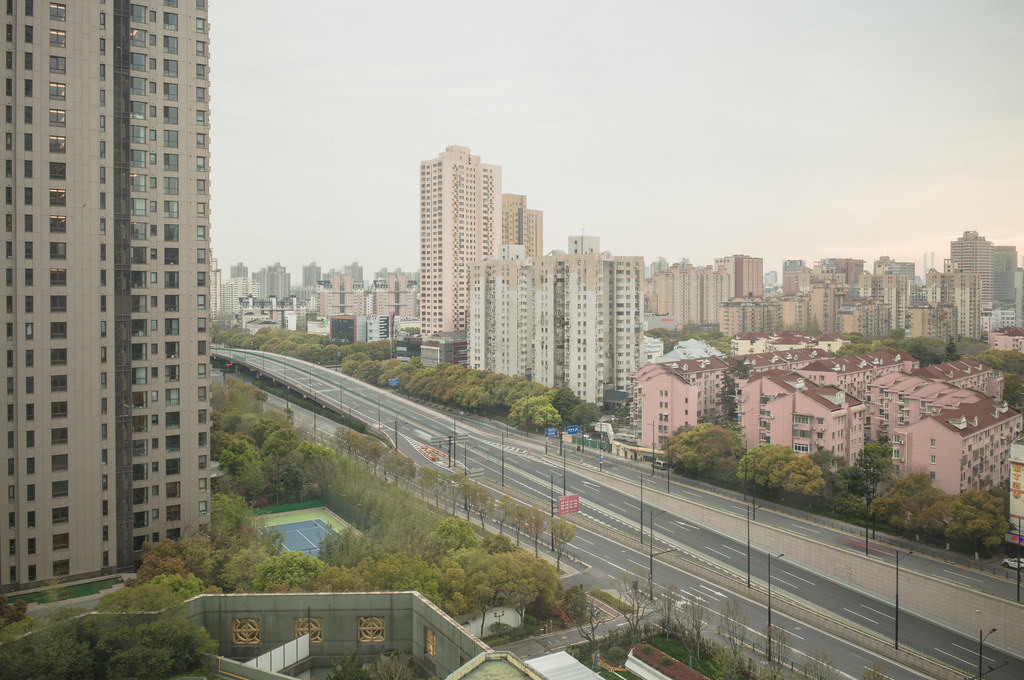
But this comparison to the Cultural Revolution really is over the top. And my experiences with my neighbors have been the exact opposite: rather than turning on each other and “denouncing” each other, relations have turned from chilly and distant (the unfortunate default in this city) to warm and helpful. I’ve honestly never felt closer to my neighbors. We’re just pulling together to make sure we all get food, can take care of our kids and pets, etc. When the one household had a positive case, no one in the building WeChat group reacted angrily. I saw nothing but positive support.
You can hear me discussing this situation on the You Can Learn Chinese podcast below (full episode is on SupChina here):
Q&A: Robots and Food
Finally, a little Q&A from an email (shout out to April!), because I’ve heard this question multiple times as a result of reports in American media:
Q: Do you see the robot dogs walking thru town asking you to stay in-doors? (saw this on YouTube).
A: No, no robot dogs (or robots of any kind). I’ve heard there are drones monitoring, but haven’t seen any myself. It’s not widespread.
Q: How is your food supply? Do you have enough food or is it delivered?
A: We have plenty of food, although we don’t have a lot of freedom to choose it. We just group order (with the other people in our building) whatever we can get when we can. Still, plenty of milk, eggs, rice, meat, etc. (Bread and fruit sometimes run out, though.)
Lockdown Changes
As of yesterday (April 19th), restrictions were loosened on both my building and on our apartment complex as a whole. We can’t leave our compound, but we can go outside again. (This is a huge plus for those of us with kids and dogs!)
It’s actually a lot like things right before the lockdown… the kids are still doing school from home. The biggest difference is that I still can’t go to the store or have most things delivered. So group buy (团购) is still the norm for getting food. (Epermarket is getting a lot of business from me this month!)
But even deliveries are starting to open up a bit. Hema (盒马) has apparently resumed deliveries to some areas, although it’s impossible to get an order in before they sell out. I hear that some restaurants and shops are resuming individual delivers (without the group buy minimum order of 1000+ RMB).
We’ve been doing tons of testing in April, both in the form of self-test antigen kits and nucleic acid PCR tests administered by others. that finally seems to be calming down too.
I’m expecting home schooling and work from home to resume for weeks still, but I’m holding out hope that regular deliveries will resume before too long. There’s hope!
14
Apr 2022More Coffee Puns from Shanghai
I brought you a bad coffee pun about a “boozy latte” from this same robot coffee provider before. They just keep on coming! Here’s two more:

Yes, that’s right… this is an ad for a corn-flavored latte. Gotta give them points for originality, right??
This main line in the ad is a pun on 玉米 (yùmǐ), meaning “corn” (literally “jade rice”) and 遇见 (yùjiàn), meaning “to meet by chance.”
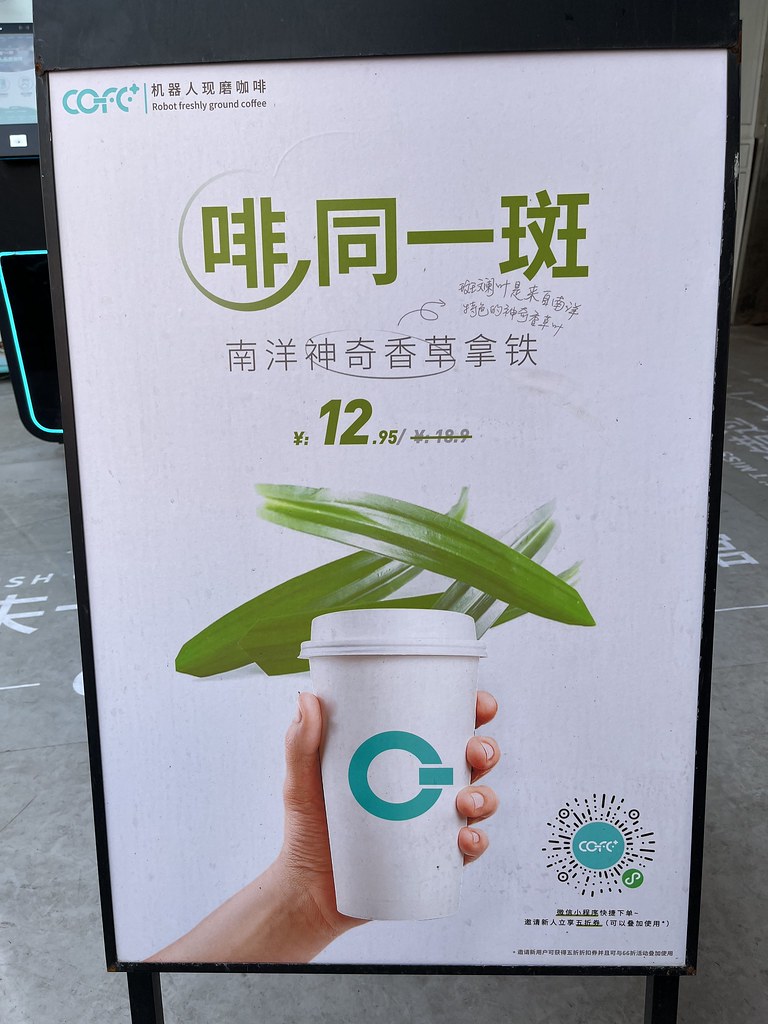
This pun is based on the phrase 非同一般 (fēi tóng yībān), which literally means “not the same as average,” implying “better than average” or “very special.” The idea is that “this is not your average cup of coffee.”
The pun comes in by swapping out the 非 (fēi) for the same sound in the word for “coffee,” which is 咖啡 (kāfēi). The same thing happened to the 般 (bān) with the character 斑 (bān), which means “stripes” or “spots,” (as in 斑马 (bānmǎ), “zebra”), which here relates to 斑斓叶 (bānlán yè), the pandan leaves in the picture.
These photos were taken a while ago, before the April 2022 COVID Lockdown in Shanghai. I’ve never had either of these (and I’m especially uninterested in corn-flavored coffee!). I do wonder if this bad punning robot coffee is going to survive… It’s been over a year since I wrote this:
I never ever see people buying coffee from these kiosks. I don’t expect them to be around much longer.
Perhaps this coffee company exists simply to make these bad puns non-stop…
07
Apr 2022Shanghai Lockdown so far (April 2022)
By now it’s not news that all of Shanghai is back in lockdown. It started for me on April 1st, and there’s no end in sight. SupChina gives a good rundown of the situation, and this old Shanghainese man’s perspective is definitely worth a read. (Fortunately the issue with parents and children being separated has already been resolved a few days ago.)
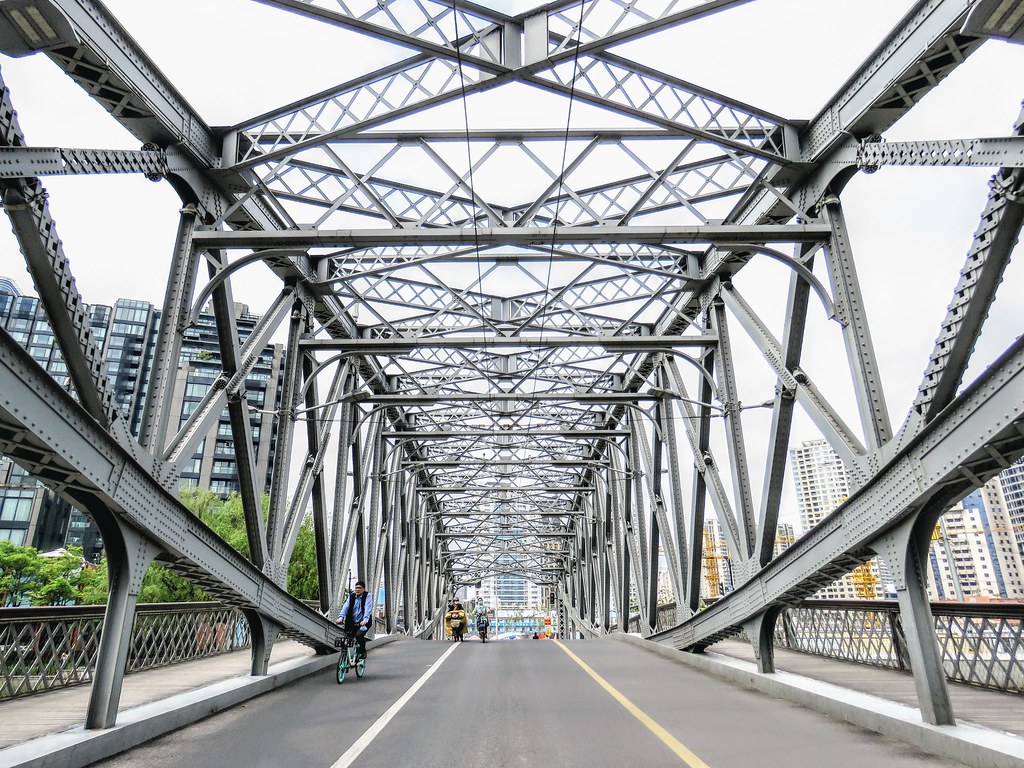
So now that the “news” is out of the way, I’ll just share a bit about how 2022 is different from 2020.
- In 2020 we never feared running out of food. There were shortages (toilet paper, anyone?), but the deliveries never stopped.
- In 2020 we could still go out, but we mostly chose not to. That’s because…
- In 2020 we were actually afraid of the virus. We felt there was a chance it could kill us or someone we love. In 2022, no one is actually afraid of getting sick anymore.
- In 2022 we are afraid of getting put on lockdown (which has now already happened), or worse, testing positive and getting separated from our families and sent off to an isolation center who knows where.
- In 2020 we could still take our dogs out to relieve themselves.
- In 2020 there was no testing (for most of the year?), but now it’s just happening all the time, over and over
- In 2020 there was fear, but energy was high. In 2022 we’re just so COVID-weary…
- In 2020 there was confidence and pride in the government’s ability to properly deal with the situation while the rest of the world floundered. In 2022 that confidence and pride still exists, but it’s quickly eroding and getting worse every day.
And now just a few tidbits about daily life under lockdown:
- I’ve heard stories (and seen videos) of people running out of food. I personally don’t know anyone who has run out of food, but we’re all living under the constant “background” fear of running out. We’re checking all of the food delivery sites every day to see if any are accepting orders again or can finally deliver the food we ordered days ago. When the government provides a free bag of food (it’s happened to me once so far), we gleefully accept it and take a picture of exactly what we got, which we then share with all of our friends on WeChat.
- Deliveries in many communities have stopped, simply because they’re no longer allowed to deliver to our doors or even our buildings, and it’s too much work for the building management to be constantly running piles of packages to every building. Only emergency packages or food get priority.
- The kids continue with online schooling, of course. My kids are fine. In fact, my son (7yo) voluntarily washed his own dishes for the first time ever after breakfast today. (Win!)
- Everyone is working from home, of course, but it’s hard for parents, with the kids in the house and the constant anxiety over COVID. We find ourselves checking 10 different WeChat groups every 10 minutes to see if there’s any news, if policies are changing, if anyone we know has tested positive, if any food deliveries will be resuming soon, if there are any new videos or memes, etc. etc. It’s hell on productivity, I can tell you!
- One positive side effect is that we’ve all been thrown into WeChat groups with our neighbors, and are now actually communicating with them for the first time (albeit over WeChat)! Relations with neighbors in modern Shanghai are notoriously distant in most apartment buildings… it’s normal to not know or ever even talk to your next-door neighbor. And now the dog owners in our complex have a group, and each building has a group… we commiserate, we share info, we notify each other when the latest test results are out, and we even go in one “group buy” food purchases. This part is pretty cool.
- BUT, even while under lockdown for so many days (this is day 7 for me), new positive cases are popping up (but nearly all without symptoms). There was one in my building. It’s mystifying and frustrating. The contagiousness of the omicron strain is just more powerful than all of these drastic measures being taken. That’s the most frustrating part… to see the same thing tried over and over again, expecting a different results. The refrain that we see again and again is, “using 2020 measures for the different 2022 situation.”
We’ll get through this. We’re not being ravaged by war, most of us are not actually getting sick. So we’re trying to count our blessings.
22
Mar 2022Mysterious Hand-written Character
This is definitely not a post for beginners. If you’re an advanced learner or literate native speaker of Chinese and take an interest in character variants, you might enjoy this, though.
Take a look at this Chinese character, hand-written for a sign in my Shanghai office:
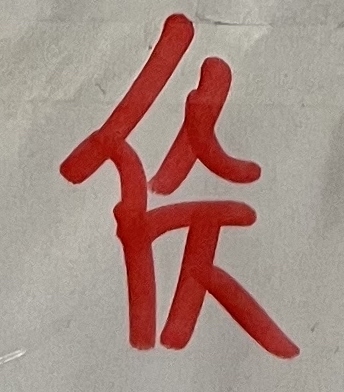
You’re likely having trouble deciphering that. On first glance, it looked to me like a person component on the left (亻), with two vertically-stacked 人 on the right, a 一 in between them. In fact, the bottom half almost looked like a Korean ㅈ to me. But no, this is Chinese, written by a native speaker/writer of Chinese, and intended for other Chinese people.
Here’s the character as part of a two-character word in context:
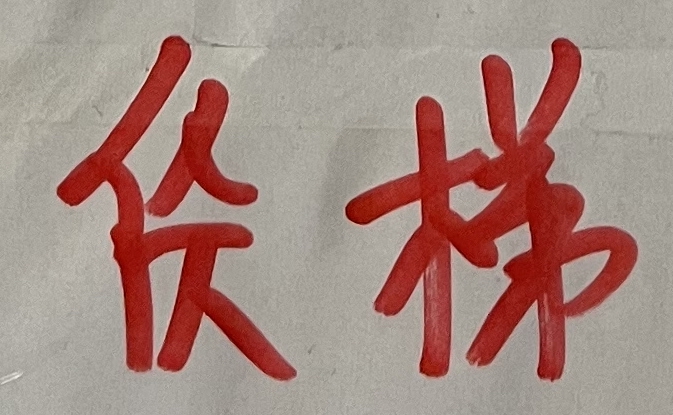
Easier to read now?
If you still can’t get it and your Chinese is sufficiently advanced, the rest of the context should make it clear enough:
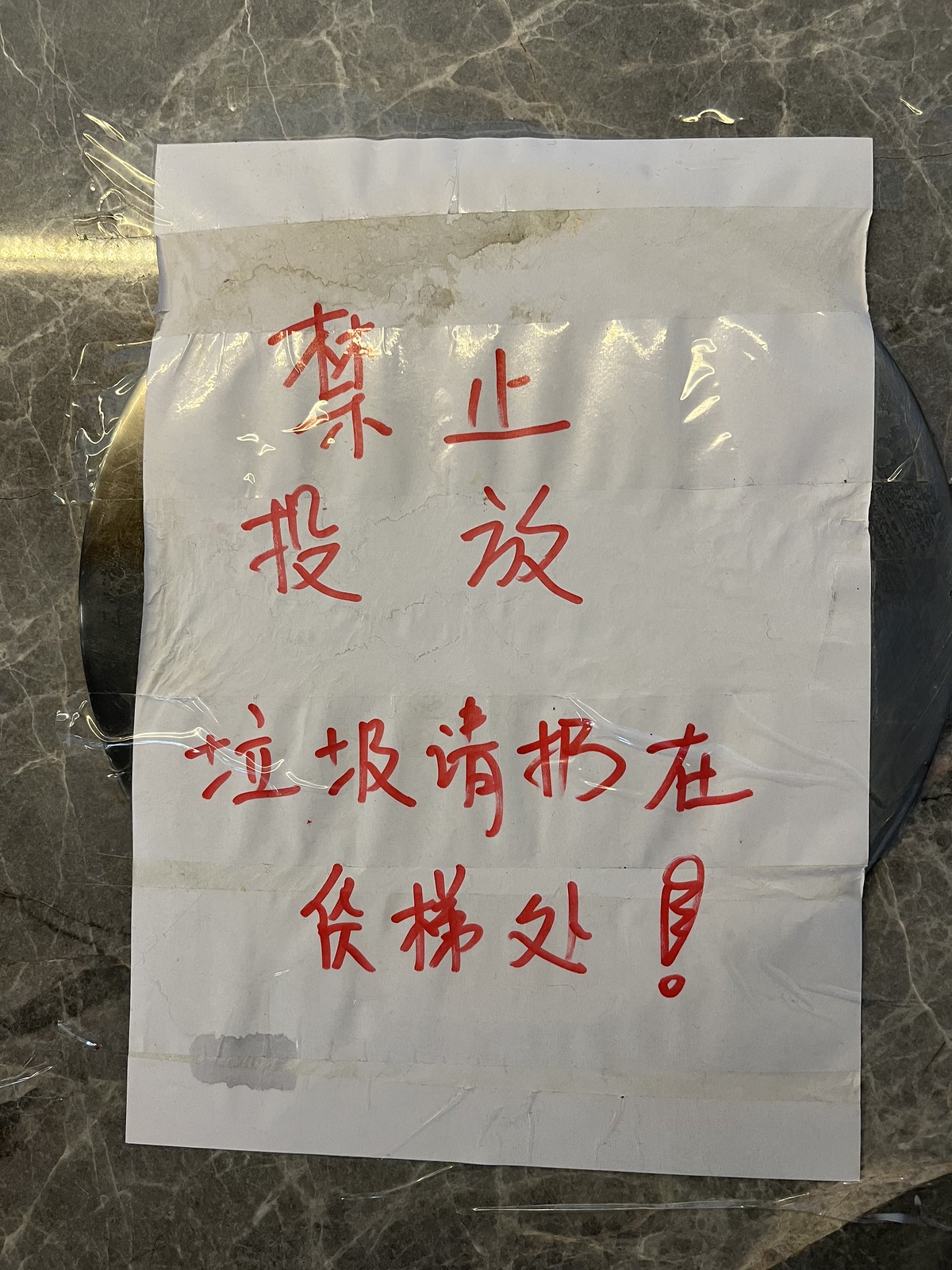
The notice reads:
禁止
投放
垃圾请扔在
货梯处!
So the mystery character here is 货 (huò), as in the word 货梯 (huò tī), or freight elevator.
Does this answer seem wrong to you? It felt wrong to me. I asked some native speakers if they could read it, showing them first the isolated character, then the full context. In every case, they couldn’t read it in isolation, but could read it in context, and while admitting it looked weird, didn’t agree that it was wrong… just sloppy.
OK, but now that we know that the character is supposed to be 货 (huò), we can make a bit more sense of it.

So here’s my analysis:
- First of all, what I originally thought was a 亻 down the left side is actually confined to the top half in a stubby 亻, the bottom of which overlaps with the form beneath it.
- The top of this character should be 化, but the right side is definitely 人 rather than 匕. I’m not sure how anyone could argue otherwise. I see this as mistake #1.
- The bottom part should be 贝, but there’s a stroke missing. I see a 厂 with a 人 inside it (仄). Not sure how you can say there’s not a stroke clearly missing on the right side. I see this is mistake #2.
Given these two clear mistakes (?), I’m not sure why native speakers don’t feel like this character is blatantly wrong, like I do. (If it’s worth anything, my fourth grader, a life-long student of the Chinese school system, couldn’t get how that could be 货 either.) But hey, differences in perception are a big part of what makes this whole language-learning adventure fun.
And, good thing actual hand-to-paper writing is becoming a thing of the past, right??
(But in all seriousness, I do welcome additional analysis!)
P.S. This is a good example where being familiar with the structural patterns of Chinese characters is useful. What I originally assumed to be ⿰ (with a ⿱ embedded on the right side) was actually ⿱. Greater familiarity with different structures gives your mind greater flexibility in character recognition.
16
Mar 2022Back to Online Schooling (COVID in Shanghai, 2022)
Starting this week, all kindergartners, primary schoolers, and middle schoolers in Shanghai have been ordered to stay home and do online lessons again (like back in 2020). This is while all kinds of apartment complexes and other buildings are going into lockdown and the city authorities scramble to regain control of the situation. Staying “COVID zero” under omicron is not so easy!
Back to Online Lessons for Kids
I think it goes without saying that having kids do lessons online is hard for parents. Our school’s schedule is 20 minutes of video lecture followed by 20 minutes of online chatroom interaction, followed by 20 minutes of rest or some homework time. Then repeat. There’s a two-hour break for lunch. While I applaud the school’s fairly realistic expectations for the kids’ attention spans, this schedule absolutely requires a parent’s constant supervision. Parents “working from home” aren’t getting much work done. (I know, this is nothing new to parents in any country who went through the online schooling thing last year and/or in 2020.)
My wife’s comment was, “and they want Chinese households to have three kids? We can barely manage two kids’ studies. Managing these kids’ studies is practically a full-time job.”
Here’s a (not-so-subtly snapped) picture of how one local baozi shop owner is dealing with the situation:
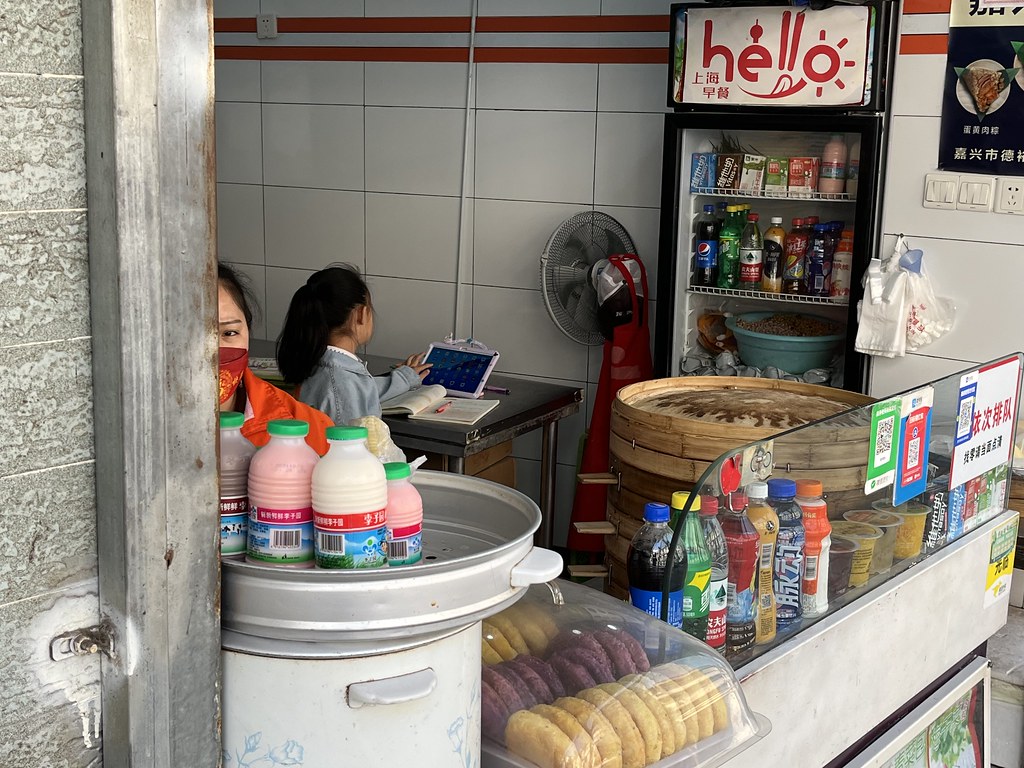
The (Brief?) Silver Lining
There is, however, a silver lining that it’s both nice and a little depressing to see. In China, most families live in big apartment complexes. You might think that this means that there are always lots of other kids in the same complex to play with. While there are definitely lots of other kids in almost any complex, under normal circumstances those kids have so much homework and so many extra-curricular activities that they rarely just “play outside” and very rarely play with the neighbor kids. But now that it’s spring, all of the kids are on the same online schooling schedule, and all extra-curriculars are forbidden I’m seeing the neighbor kids all outside playing together for… well, probably the first time ever. And I’m hearing other parents say the same thing about the kids in their own apartment complexes.
And now… Coffee!
Finally, I have randomly chosen these past few weeks to start trying Manner Coffee, an up-and-coming coffee brand in Shanghai. It’s really good! I’m a big fan of the “apple pie” latte (Oatly milk, a little coconut flavor, a little apple flavor, and some cinnamon).

10
Mar 2022Accosted on the Street in Shanghai
Aside from COVID updates, I don’t write a lot about daily life in Shanghai these days. After living in China 20+ years, there’s not a lot that feels worth mentioning. Recently, though, I had a very new experience.
The Incident
I was walking down the sidewalk one morning, heading to the office. You can see from this picture what a normal stretch of sidewalk it was:

I was walking “toward the camera” (like the two people in the foreground of the photo above). I was about where the woman in the tan jacket is.
Then I noticed a woman (around 40?) walking toward me on the sidewalk lock eyes with me. She looked unhappy. I had no idea who she was or why she might be upset with me.
When I got close to her, she planted herself right in front of me and told me (in English) that I wasn’t allowed to walk in that direction on the sidewalk. I was confused. This was a sidewalk I’d literally been walking back and forth on for years. Right next to me on the sidewalk were other pedestrians walking the same way. I tried to just walk around her, but she quickly moved to block me and even grabbed hold of my jacket. She refused to let me pass.
As I kept trying to go around her, she got angrier and angrier at my “insolence.” She insisted that I was walking the wrong way on the sidewalk, and that I had to walk the other way to the intersection a block down, cross the street, and walk on the other side of the street. Not only was this a ridiculous 10-minute detour, but it’s just blatantly untrue. This was not a one-way sidewalk, and even if the woman was somehow right, she was also just ignoring everyone else who was walking the “wrong” on the same stretch of sidewalk. People on bikes and scooters too.
As the woman started shouting at me that foreigners can’t just do as they please in Shanghai, a crowd was gathering. Mostly delivery guys and elderly local residents. Fortunately, since we were now speaking in Chinese, everyone could understand what was going on. Some of the elderly Shanghainese bystanders started to interject.
“Of course he’s allowed to walk that way. It’s a sidewalk.”
“What are you talking about? Let him go.”
And to me, quietly, “there’s something not right in her head.”
“Mind your own business!” the woman snapped at them.
As the incident dragged on, a kindly old man called the police for me. I had started recording everything on my phone shortly after the altercation started, for my own protection. (This angered her at first, but then she ignored it.) I wasn’t about to push the woman or lay a hand on her in any way, but who knew what story would be told later. So I needed video proof.
As the minutes dragged on, the police didn’t show up, and one of the bystanders, an old Shanghainese man, started arguing with her. It turned into a shouting match and, unfortunately, got a bit physical between the two of them. No one was hurt, but the end result was that the woman stormed off, shouting obscenities at the old man.
I was free.
The old folk assured me that I had done nothing wrong, and that she wasn’t right in the head.
It had wasted about 15 minutes of my day, and left me unsettled.
A Few Thoughts
- Mental health is a tricky issue that is often avoided in China. It’s traditionally viewed as a personal, family matter, and there’s shame associated with seeking help. I do see the situation getting better, but it’s slow going. No one knows how to react to public incidents like this. I do wonder what the police would have done, had they showed up.
- I do have a video of the incident, but I see no reason to share it.
- What if it wasn’t a matter of “walking the wrong way on the sidewalk,” but riding a bike or a scooter the wrong way on the street? This does happen… You see people riding the wrong direction in the bike lane all the time. It’s illegal, and it’s dangerous, but people do it. If a foreigner were to get called out for doing that (despite other locals around doing the same thing), a doubt the foreigner would get any sympathy from bystanders. Very different situation, legally, but also similar.
- The locals totally supported me. It’s key here that they could understand what was being said. If our conversation had stayed in English, they might have made some incorrect assumptions and sided with the woman, without really knowing what had happened.
- The woman herself was not from Shanghai, and she even proudly declared that she had just arrived from Beijing. A coworker of mine declared that this proclamation negated any sympathy she might have gotten from the local bystanders. I’m not sure.
Stay safe, everyone. And stay calm!
03
Mar 20223D Chinese Characters in Shanghai
I was interested to stumble across these weird 3D Chinese character benches (?) on a walk through Shanghai the other day:

They read:
小红书
街角趣动场
So 小红书 (Xiǎohóngshū) is a social media network, and this is some kind of promotional exercise area they’ve sponsored, which they call 街角趣动场 (Jiējiǎo Qù Dòng Chǎng). 街角 (jiējiǎo) refers to a street corner, and 趣动场 (Qù Dòng Chǎng) appears to be a word they’ve created on their own.
If you’re interested, it’s here:

And yeah, it’s also got these Super Mario question mark boxes, which is weird, but cool, I guess?

